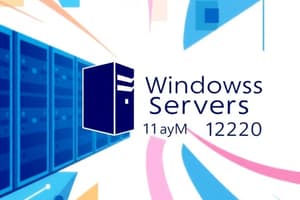Podcast
Questions and Answers
Which of the following features is NOT supported by Windows 10 desktop operating system?
Which of the following features is NOT supported by Windows 10 desktop operating system?
- Web server
- File and Printer Sharing
- Hyper-V
- Domain Name System (DNS) (correct)
Windows Server 2012/R2 is designed to run desktop applications primarily.
Windows Server 2012/R2 is designed to run desktop applications primarily.
False (B)
What is one of the main advantages of using Datacenter Edition of Windows Server 2012/R2?
What is one of the main advantages of using Datacenter Edition of Windows Server 2012/R2?
Unlimited number of virtual instances
Windows Server 2012/R2 supports features such as _____ to provide fault tolerance.
Windows Server 2012/R2 supports features such as _____ to provide fault tolerance.
Match the following features with the appropriate operating system:
Match the following features with the appropriate operating system:
Which of the following statements is true regarding the Foundation Edition of Windows Server?
Which of the following statements is true regarding the Foundation Edition of Windows Server?
The Foundation Edition of Windows Server supports Hyper-V.
The Foundation Edition of Windows Server supports Hyper-V.
What is virtualization in the context of cloud computing?
What is virtualization in the context of cloud computing?
A virtual machine (VM) emulates the hardware and _______ of a physical computer.
A virtual machine (VM) emulates the hardware and _______ of a physical computer.
Match the following components with their descriptions:
Match the following components with their descriptions:
What is a primary function of the Microsoft Management Console?
What is a primary function of the Microsoft Management Console?
The Workgroup Model is more suitable for networks with more than 10 computers.
The Workgroup Model is more suitable for networks with more than 10 computers.
What role must a Windows server have to act as a domain controller?
What role must a Windows server have to act as a domain controller?
The Domain Model is preferred for a network that requires __________ security and resource management.
The Domain Model is preferred for a network that requires __________ security and resource management.
Match the following features with their respective models:
Match the following features with their respective models:
Flashcards are hidden until you start studying
Study Notes
Operating Systems Overview
- Windows 10/11 primarily designed for desktop computers but can perform limited server functions.
- Server operating systems (e.g., Windows Server 2012/R2) focus on network performance and background processes rather than desktop applications.
Windows Server 2012/R2 Network Services
- Offers diverse network services including:
- File and Printer Sharing
- Web Server
- Routing and Remote Access Services (RRAS)
- Domain Name System (DNS)
- Dynamic Host Configuration Protocol (DHCP)
- File Transfer Protocol (FTP) Server
- Active Directory
- Distributed File System (DFS)
- Hyper-V for virtualization.
Differences Between Windows Desktop and Server OS
- Windows 10 features limited server capabilities (e.g., Hyper-V, File and Printer Sharing) and supports a maximum of 20 simultaneous users.
- Windows Server 2012/R2 supports advanced fault-tolerance features like RAID 5 and load balancing.
Windows Server 2012/R2 Editions
- Streamlined editions include:
- Datacenter: Unlimited virtual OS instances allowed.
- Standard: Limited virtualization rights compared to Datacenter.
- Essential: Entry-level for small businesses; OEM only, supports 15 users, no CALs required.
- Foundation: Single physical processor, up to 32 GB RAM, no Hyper-V support.
Cloud Computing and Virtualization
- Cloud computing abstracts delivery of applications, storage, and resources.
- Virtualization enables multiple operating systems to run on one physical server through virtual machines (VMs).
- Hosts connect and manage VMs through virtualization software.
Microsoft Management Console (MMC)
- Centralized management interface for server administration.
- Enables remote server connections, enhancing management capabilities.
Disk Management
- Tool for handling disks and volumes within Windows Server 2012/R2.
File and Printer Sharing Features
- Advanced functionalities include shadow copies, disk quotas, and DFS.
Windows Networking Models
- Workgroup Model: Peer-to-peer network suitable for small user groups (<10), employs decentralized management.
- Domain Model: Centralized management preferred for larger networks; requires a domain controller with Active Directory functionality.
Key Networking Components
- Network Connection: Aggregation of networking components.
- Network Interface: Consists of the NIC and device driver software.
- Network Protocol: Defines rules and formats for device communication.
- Network Client and Server Software: Clients request resources; servers respond and manage shared resources.
Server Roles and Features
- Server roles define major functions/services provided by servers.
- Role services enhance main functionalities; features support and enhance roles.
Active Directory Certificate Services (AD CS)
- Provides digital certificate management; more user-friendly than VPNs.
Windows Deployment Services (WDS)
- Simplifies network-based Windows installations, enabling remote configuration of Windows 10/11 and Server 2012.
New Features in Windows Server 2012/R2
- Notable enhancements include Server Core, Minimal Server Interface, PowerShell, Storage Spaces, ReFS, IP Address Management (IPAM), and Dynamic Access Control.
PowerShell
- Interactive scripting environment used for management tasks; features "cmdlets" for command execution.
- Windows Server 2012 R2 and newer editions come with PowerShell 4.0, facilitating various management operations.
IP Address Management (IPAM)
- Tools for monitoring and managing DHCP and DNS servers.
- Offers auditing capabilities for IP address usage and tracking changes within the network.
Studying That Suits You
Use AI to generate personalized quizzes and flashcards to suit your learning preferences.




